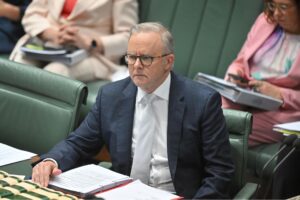Back in 2003, then prime minister John Howard spoke to ABC radio Brisbane and made the infamous claim that no one was approaching him on the street to complain about their house prices going up.
Someone did, however, in that very same talkback segment. Phyllis rang in to say she did want to complain, because she wanted to retire and downsize, but property prices were growing so fast that she was worried about buying and selling in the same market – even if it was a smaller property.
Howard told her she was wrong.
“You’re not actually complaining. What you’re really saying is the value of a house hasn’t gone up enough,” he said.
Phyllis was having none of it: “No, no, no. I disagree. I think that it is ridiculous that the inflation of the housing prices … what about our grandchildren?”
Phyllis was right. Because while she complained, in late 2003, about people having to spend “$500,000 … on some broken-down old dump”, the median house price for her grandchildren – assuming they live in Queensland – is now $977,300.
The government knew house prices were a problem then, and it knows they are a problem now.
And just like Howard, who was told by the Productivity Commission in 2004 – in a briefing prepared for his cabinet – that an urgent review of his capital gains tax changes was needed to arrest the jumps in the housing market, every single government has only made short-term changes that ultimately make the situation worse, rather than get to the root cause. And they are STILL doing it.
In 2003 Howard blamed low interest rates for rising house prices, as people could afford to borrow more.
In 2004, in dismissing reports from the noted communists at the International Monetary Fund, Treasury advised his government that house prices had grown in other nations (true) and if there was an issue with things like the capital gains tax discount, then the sharemarket would have also seen a bump, and hadn’t.
Which is a fundamental misunderstanding in how the investor mindset works. You don’t need to speculate in the stock market if you are betting on house prices continuing to rise and that’s how you make your money.
And that is how they have made their money since the first full year of both negative gearing and the capital gains discount.
We know that, because that is what the cold, hard data (so woke!) tells us.
Yes, there has been negative gearing for a really long time. But before 1999, residential investment property owners reported a net rental position that was sometimes positive and sometimes negative, but no real big jumps either way. After 1999, when Howard – for *reasons* – introduced the capital gains tax discount, the net rent position jumped to negative and substantially so.
In 1999-2000, landlords reported a net rental profit of $156 million. In 2002-03, they reported a net rental loss of $1.5 billion. That doubled to a net reported loss of $3.1 billion in 2003-04, and peaked at a record $9.1 billion loss in 2007-08. Billions of dollars in losses have been reported every year since (except when the cash rate was cut to almost zero in 2019-22).
So we have the data. We have the timeframe. We have the first hand experience.
You know what we don’t have? Action.
On Wednesday, the Labor government celebrated the start date of its expanded 5 per cent deposit scheme, which essentially makes the government a lender’s mortgage insurer. But those attempting to get into the market are bracing for prices at their end of the market to rise even higher.
Australian governments are great at unintended consequences flowing on from their tinkering. Talking to mortgage brokers and first-home owners, one of those consequences from the expansion of the 5 per cent deposit scheme is that people who don’t qualify for it (maybe having owned a property with a previous partner, or having helped a family member in the past) but have a deposit, risk being outbid on properties by those using the 5 per cent deposit scheme, who don’t need to worry about lenders’ mortgage insurance.
So demand has been added, directly at the point where supply is already an issue.
Howard didn’t want to do anything about the capital gains tax discount in 2004 when the Productivity Commission was sounding the alarm bells, because he worried about what a drop in house prices, as investors left the market, would mean for the government politically.
Apart from a small blip of courage in 2016 and 2019, when the Labor opposition floated it as a policy (and the resulting scare campaign having since zapped any backbone from Labor for any necessary reforms), every government and would-be government has followed suit.
So here we are, in the most obvious game of Cluedo policy ever to be played, standing around the body of the home ownership dream, scratching our head as to who is to blame, while the capital gains tax discount holds a giant knife.
Perhaps, in another 20 years, when Brittany is using her neurolink to complain to her favourite AI host about the cost of human pods for her grandtubes, we’ll find a government willing to act.
Between the Lines Newsletter
The biggest stories and the best analysis from the team at the Australia Institute, delivered to your inbox every fortnight.
You might also like
Does the government understand its own hate laws?
The government passed new gun control and hate speech legislation in a special parliamentary sitting, but what impact will they have on Australian democracy?
What conservatives do better | Between the Lines
The Wrap with Amy Remeikis If there is one thing you can bank on, it is that conservative governments know how to use power. They never shy away from it. If a conservative government wants to change something, it will, and it won’t worry about who it is annoying, or the pushback, or whether or
The cruel housing hoax
Amy Remeikis and Bill Browne discuss the federal election campaign so far, the performance of the media, and how preferential voting actually works.



